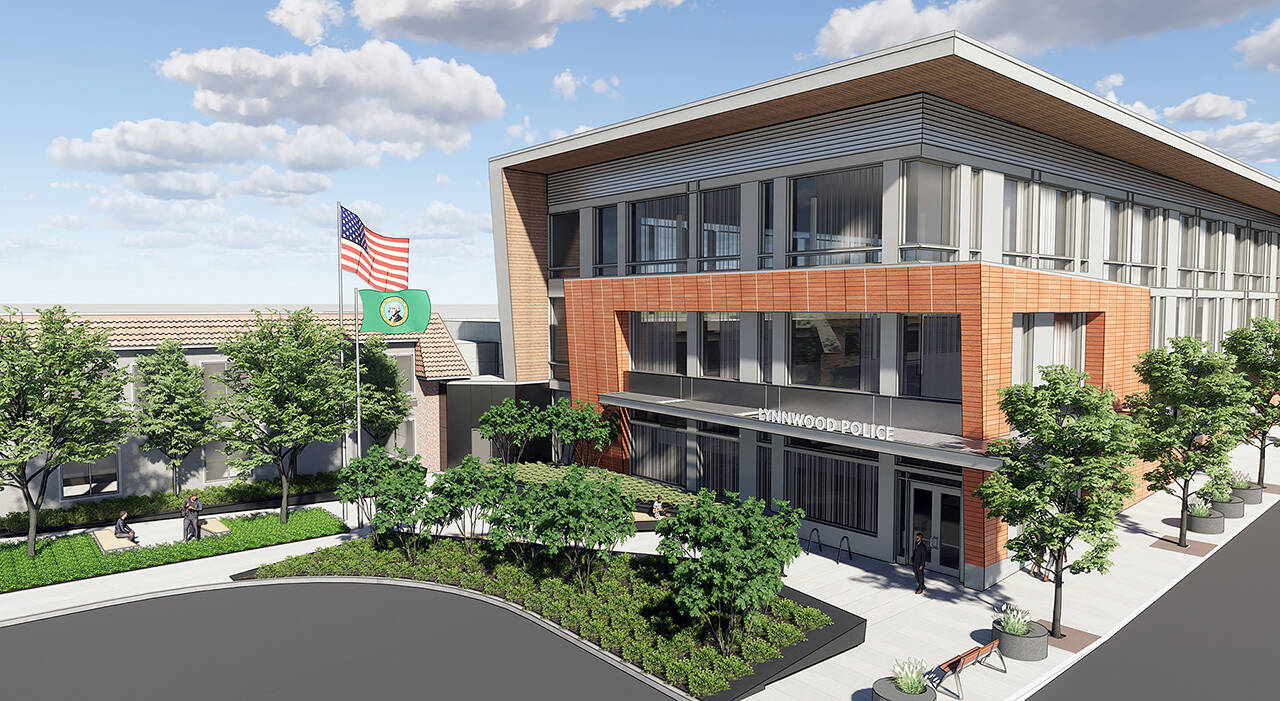LYNNWOOD — Plans for a new jail here now include a mental health wing amid calls to redirect resources from incarceration to recovery initiatives.
The proposed Community Justice Center, which would house a new jail, a misdemeanor court and the police department, was to include 120 jail beds, a marked increase from the 46 beds in the current facility. Under the new plan, it will have 84 beds, police chief Jim Nelson said at a Tuesday evening City Council meeting.
Nelson said that before the COVID-19 pandemic diminished capacity, the city needed about 70 beds. One day last month there were only two people there.
Tuesday’s meeting was the council’s first since it delayed a vote last month on the construction contract for the center in the face of strong criticism from the family of a woman who died by suicide in the jail in July and others. Since then, a task force headed by state Rep. Lauren Davis, a Democrat from Shoreline, and Nelson has met for the past five weeks to develop the plan. On Tuesday, it was presented to the public for the first time.
The 12,750-square-foot Community Recovery Center would include a resource side to connect the facility’s clients with housing and other services. Davis likened it to the social services hub at Everett’s repurposed Carnegie Library. Over three-quarters of the Lynnwood Jail inmates surveyed in 2018 said they had an addiction to drugs or alcohol. The same percentage said they would enter treatment.
“We kind of see people at, often times, the very start of their brush with law enforcement, and the sooner we can direct them away the better, certainly for themselves and the betterment of our community,” Nelson said.
It would also have a behavioral health urgent care center, Davis said Tuesday. Providence Regional Medical Center Everett opened one in 2019. It has served over 3,400 patients, the hospital’s director of behavioral health, Laura Knapp, said last week.
Davis said the top two places people go when in a mental health crisis are the emergency room or jail. That doesn’t work, she said.
“Often times, people end up trying to seek treatment for behavioral health care, an emerging issue, and they are told the wait to see a provider, a mental health therapist or a psychiatrist is six weeks, eight weeks. That’s very typical in the state of Washington,” said Davis. “And so what happens then is people end up in the emergency department, and I can tell you the emergency department is not a therapeutic environment for people in behavioral health distress. Neither is jail.”
Another aspect of the plan is a crisis stabilization unit for people who come to the urgent care center but aren’t stable enough to return home.
The changes mean a slight delay of the construction timeline. The new facility was previously expected to be completed by the end of August 2023. Now it’s estimated for early October of that year.
The center’s original price tag was $64 million, but bids to build it came in high. The price jumped up to $69 million. The vast majority of that money will come from bonds, and the rest will be from an existing criminal justice sales tax.
But the money for the new behavioral health initiative will be separate. Advocates don’t yet have an estimate on cost. Davis said she and other 32nd Legislative District lawmakers would lobby the state for money. Snohomish County Executive Dave Somers plans to include $3 million for the proposal in his 2022 budget plan.
“Snohomish County commends the City of Lynnwood for their desire to contribute to solutions by creating additional treatment beds utilizing space within their planned new facility,” Somers wrote in a Tuesday letter to the City Council and mayor.
The reduction in jail beds also means the city will take in less money making beds in the new jail available to nearby cities, said Lynnwood finance director Michelle Meyer. One bed for a day would cost another city $175. Lynnwood planned to make over $1.8 million annually from contracting the center’s beds. The new facility would bring in under $1.1 million.
While owned by the city, the mental health space would be rented out to a behavioral health provider. For example, the hub at Carnegie is run by Seattle-based Pioneer Human Services.
The City Council will vote on the construction contract for the Community Justice Center next Monday, said Mayor Nicola Smith.
Jake Goldstein-Street: 425-339-3439; jake.goldstein-street@heraldnet.com. Twitter: @GoldsteinStreet.
Talk to us
> Give us your news tips.
> Send us a letter to the editor.
> More Herald contact information.

























